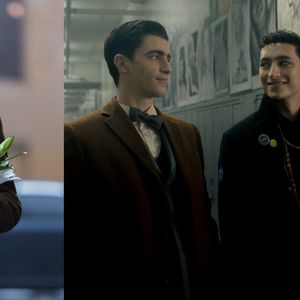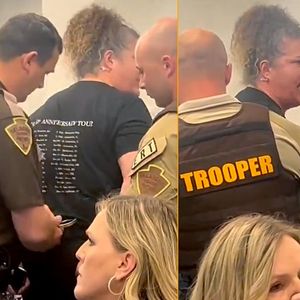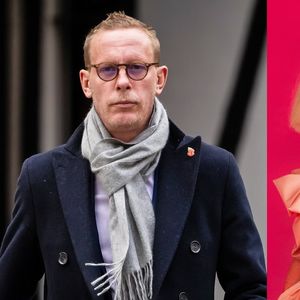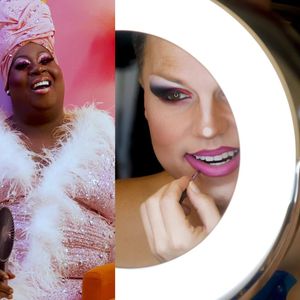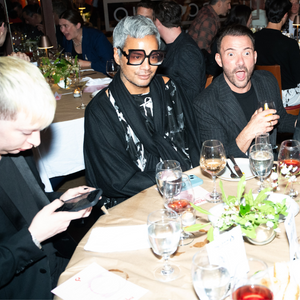"A book for which publishers have been angling for years has been signed and sealed," proclaimed Random House in a press release dated January 4, 1960. "We expect that The Judy Garland Story will be our ACT ONE for 1960," added publisher Bennett Cerf. What promised to be the book deal of the decade was personally negotiated by Cerf during a visit to Judy Garland's room at Manhattan's Doctors Hospital, where she spent seven weeks near the end of 1959.
"Those great, hypnotic brown eyes of hers were not there." recalled Judy's ghostwriter Freddie Finklehoffe, a longtime friend and Metro-Goldwyn-Mayer scenarist. "Just little dark spots, sunken in the fat and bloat of her face. Those famous legs, the ankles of a gazelle, were fat and heavy and she had trouble getting into her shoes. ... [The doctors] announced the verdict. Sid [Luft] told me. 'Hepatitis and very bad.' That's what he told Judy. But he was lying to her as he lied to me. She had cirrhosis of the liver -- and very bad." With physicians prescribing retirement and saying she'd forever be a "semi-invalid," the 37-year-old's career seemed at its end.
It has been said that husband Sid Luft pitched Judy's autobiography to Bennett Cerf as soon as he realized his wife would not be fit to return to performing and touring anytime soon, and maybe never. Upon signing the book deal with Random House, Judy was reportedly paid an advance in the amount of $35,000. Cerf later recalled an advance of $20,000 to be split with Finklehoffe. Either way, Judy never saw a dime. Some say it was later that same day that Sid bet and lost the entire sum at the horse races.
"There have been a lot of stories written about me ... some of them fantastically distorted," Judy announced in a press statement made from her hospital bed. "This book is going to set the record straight." Still terribly ill, she was discharged on January 5, 1960, and returned to Los Angeles to begin what promised to be a lengthy recuperation period. Recalling the incident a year later, Judy said: "You want to know something funny? I didn't care. All I cared about was that my children needed me. Suddenly the pressure was off. I just laid there, watched TV, read novels, and thought, no more pills ever, now I'm free. I'll find a way to be happy."
Judy may have lost the ability to sing, but it was during this time that she found another voice. Working closely with Finklehoffe, she recorded a number of stories and reminiscences on audio tape. Random House execs expected a quick turnaround, but on September 26, 1960, Cerf stated in a letter published in the Garland Gazette, a fan club journal, that he'd "not yet seen one line of manuscript of the Judy Garland autobiography."
In an effort to appease the publisher, Finklehoffe soon delivered 65 pages of rough draft, but the project with Random House soon fizzled as Judy made a full recovery, abandoned the book, and returned to work. According to Cerf, Finklehoffe "vanished into thin air. I hoarded those pages, and every once in a while, Judy would say, 'I'm really going to finish that, you know.' She felt very guilty about it. She's a good girl. She doesn't mean to do unforgivable things, but she is absolutely discombobulated between liquor and pills." Random House eventually reclaimed its advance when it sold Judy's story to McCall's and Finklehoffe's pages came together to create a two-part feature for the magazine in 1964. "We got back our money and a little bit more," Cerf said. "But there's no book."
 Above: Gypsy Rose Lee and Judy Garland, 1965
Above: Gypsy Rose Lee and Judy Garland, 1965
It was an angry, bitter, and obviously overmedicated Judy who revisited the idea of an autobiography during the spring of 1964, following the cancellation of her CBS television series. "I'm going to talk," she demanded. "And somebody's going to print this. Even if I have to put up the money myself, I'll print it in a little book ... maybe somebody will read it ... and maybe somebody will learn a little of the truth of this so-called legend! That's what I'm supposed to be, a legend. Judy Garland. Alright, then read about her. Read the truth, though!"
Again, during the summer of 1966, Judy took time to record more of her memories and thoughts to tape. "I think that I have every right to write a book," she said. "I think I'm interesting. I have perspective about me." The earliest recordings made during this period were thoughtful and honest, but quickly took on a more jaded and resentful tone. "I'd like to expose a lot of people who deserve it [...] and I'd also like a few questions answered ... questions that I'm sure I'll find my own answers to by talking about things that I've buried within myself too long. ... Why? Why did the agents do this? Why did M-G-M behave the way they did? Why have the newspapers printed such idiotic and messy stories? Why was I not allowed to talk? Why was I overworked? Why was I ... I think I know why. I just don't think anybody's ever taken the time to listen."
At times Judy was clearly in a narcotized state and even became enraged. She took to screaming and shouting into the recorder, saying, "I'm not something you wind up and put on the stage that sings Carnegie Hall album and you put her in the closet [...] I'm gonna write a book, and I'm gonna talk, because I can do something besides sing, you know. I don't always have to sing a song. There is something besides 'The Man That Got Away' or 'Over the Rainbow' or 'The Trolley Song.' There's a woman. There are three children. There's me! There's a lot of life going here. I wanted to believe and I tried my damndest to believe in the rainbow that I tried to get over and I couldn't. SO WHAT!"
Judy phoned Cerf again in 1966, but her pleas for another book deal were not met with any sort of monetary advance from the publisher as she hoped. "I've always loved Judy Garland," Cerf said the following year. "She is an irresistible little woman -- but one of the most tragic in the world. I'm sure that one day she's going to do herself in."
 Above: Liza Minnelli, Judy Garland, Joey Luft, and Lorna Luft
Above: Liza Minnelli, Judy Garland, Joey Luft, and Lorna Luft
That would be Judy's last effort to tell her own story. Discouraged, but easily distracted, she put the elusive book project back on the shelf. "When you have lived the life I've lived," she explained in 1967, "when you've loved and suffered, and been madly happy and desperately sad -- well, that's when you realize you'll never be able to set it all down. Maybe you'd rather die first."
For all the chaotic tirades, there were moments of passion and tenderness, too, with Judy seeming genuinely determined and eager to tell her story. "I can guarantee you," she said in her final tapes, "even if I have to form a new publishing company and write this book, it's going to be one hell of a great -- everlastingly great -- book with humor, tears, fun, emotion, and love." She even toyed with ideas for a book title. She wittily told daughter Liza Minnelli her story would be titled Ho-Hum: My Life, and revealed to others that it might be called simply Judy, or So Far So Good, or And Now, Ladies and Gentlemen, Miss Judy Garland.
(RELATED: An Excerpted Interview From the Book)
"How's your autobiography coming?" Judy was asked in 1968. "It's been quite a packed-in life," she answered. "It will take years." Fueled by episodes of despair, stalled in moments of hope, Judy's efforts to compose an autobiography were inadequate and never resulted in much more than a few tapes of recorded rants and reminiscences. She abandoned her work repeatedly, and even Finklehoffe's sixty-five-page manuscript for Random House never amounted to much more than a disarranged transcription of the tapes the two made in 1960. With all such ventures incomplete, stalled, or suspended by the time of her death in 1969, it seemed as though Judy's telling of her life story would never come to fruition -- until now.
Judy Garland on Judy Garland: Interviews and Encounters is the closest we will come to experiencing and exploring the legend's planned autobiography. Collecting and presenting the most important Garland interviews and encounters that took place between 1935 and 1969, this work opens with her first radio appearance under contract with Metro-Goldwyn-Mayer, and concludes with her last known interview, one taped for Radio Denmark just months before her death. What makes this collection unique is that it places Judy in the role of storyteller. She wrote a number of essays for various publications and sat for countless print, radio, and television interviews. These and other autobiographical efforts she made are proof that Judy Garland wanted her story told in her own words.
 In assembling this work, the Judy that emerged was not one of turmoil and tragedy, as one might expect. Overall, she comes across as a positive, optimistic woman who sought a better life for herself and especially her three children. Several topics that stood out to me were those addressing issues of importance -- even today -- to the gay community. It's comforting to learn that Judy was an open-minded, compassionate individual. The following quotes are favorites of mine and those I found to be especially relevant for this audience:
In assembling this work, the Judy that emerged was not one of turmoil and tragedy, as one might expect. Overall, she comes across as a positive, optimistic woman who sought a better life for herself and especially her three children. Several topics that stood out to me were those addressing issues of importance -- even today -- to the gay community. It's comforting to learn that Judy was an open-minded, compassionate individual. The following quotes are favorites of mine and those I found to be especially relevant for this audience:
ON DIVERSITY:
"When you get to know a lot of people you make a great discovery. You find that no one group has a monopoly on looks, brains, goodness or anything else. It takes all the people -- black and white, Catholic, Jewish and Protestant, recent immigrants and Mayflower descendants -- to make up America. It just wouldn't be our kind of America without any one of them."
--Speaking for America, Scholastic Magazines, 1946
ON RELIGION:
"I believe that the real expression of your religious beliefs is shown in the daily pattern of your life, in what you contribute to your surroundings and what you take away without infringing on the rights of other people. I don't disapprove of people who make a habit of focusing all their thoughts on religious ideas, unless they let religion become an opiate with them and do harmful things to other people. No one should feel that because he goes to church every Sunday he can do cruel things which people are not ordinarily supposed to do and that God will overlook his bad behavior. I like going to church at Christmas, Easter and when I'm not working, because it is peaceful there and a place of goodwill, where some of the nicest people in the community congregate. But real religion is in your mind and heart, and can't be judged by the number of times you go to church."
--Screenland, October 1946
ON SPIRITUALITY:
"Of course I believe in God ... because it's ridiculous to not believe in God ... because I have proof [that He's there]. I've been protected and watched over, and my children have been. It's just a knowing and living knowledge that brings a great deal of comfort to me."
--To Barry Gray, July 1967
ON HER GAY FOLLOWING:
"I couldn't care less. I sing to people!"
--San Francisco Press Conference, August 1965
"For so many years I've been misquoted and treated rather brutally by the press, but I'll be damned if I'll have my audience mistreated."
--To Irv Kupcinet, Kup's Show (Chicago), September 1967
RANDY L. SCHMIDT is the author of Judy Garland on Judy Garland: Interviews and Encounters, which is the latest book in the "Musicians in Their Own Words" series from Chicago Review Press. The book is due September 1. For more information, please visit RandyLSchmidt.com.
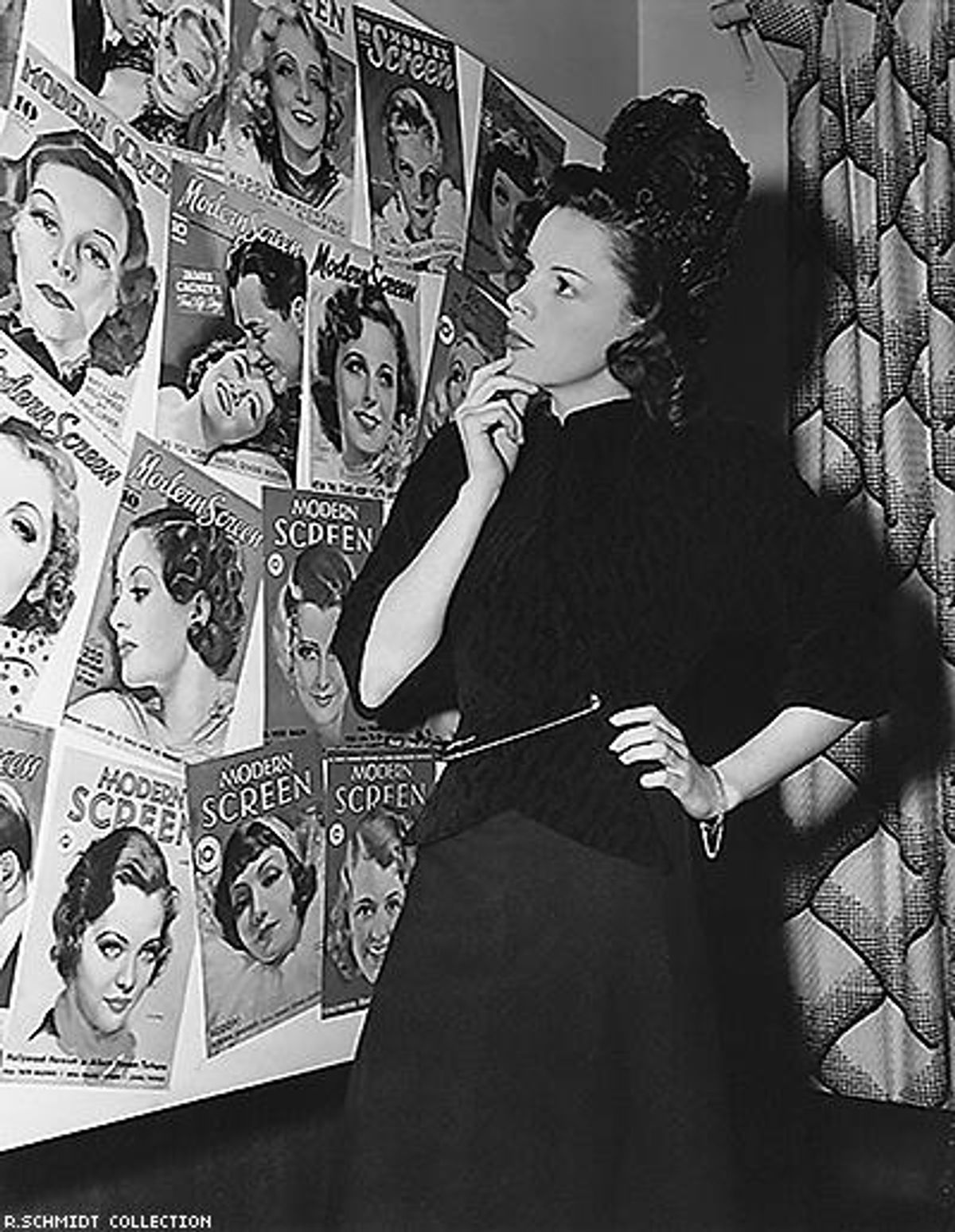

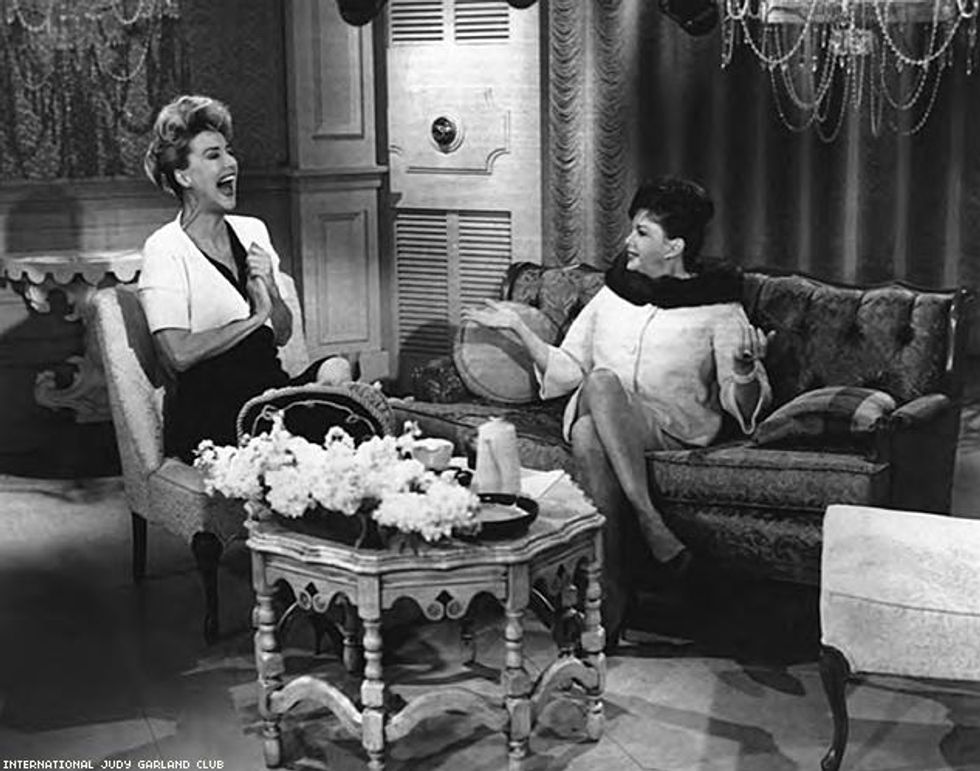 Above: Gypsy Rose Lee and Judy Garland, 1965
Above: Gypsy Rose Lee and Judy Garland, 1965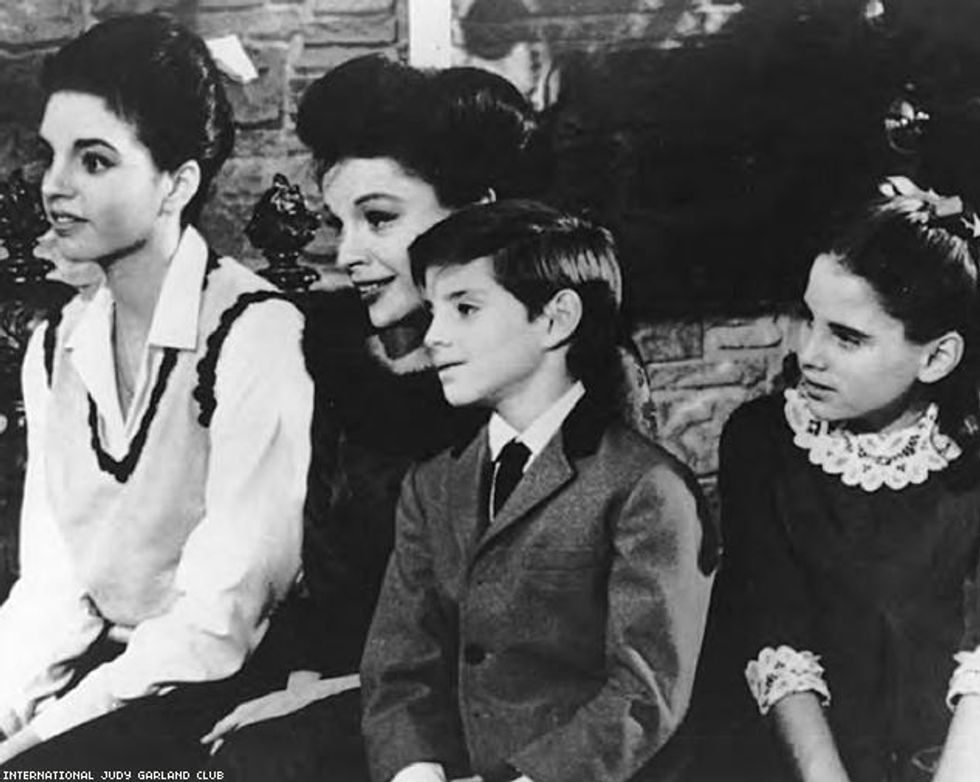 Above: Liza Minnelli, Judy Garland, Joey Luft, and Lorna Luft
Above: Liza Minnelli, Judy Garland, Joey Luft, and Lorna Luft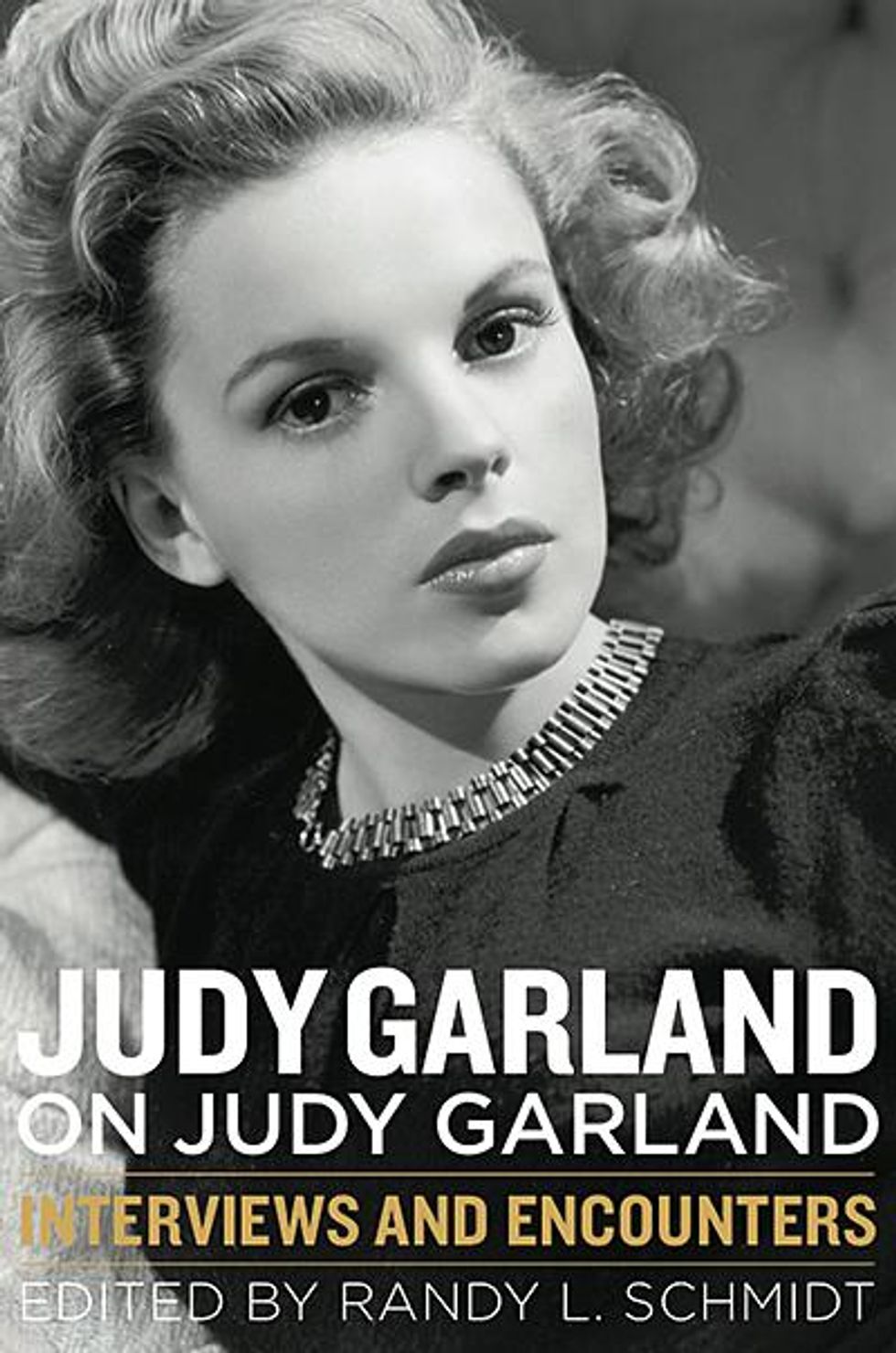 In assembling this work, the Judy that emerged was not one of turmoil and tragedy, as one might expect. Overall, she comes across as a positive, optimistic woman who sought a better life for herself and especially her three children. Several topics that stood out to me were those addressing issues of importance -- even today -- to the gay community. It's comforting to learn that Judy was an open-minded, compassionate individual. The following quotes are favorites of mine and those I found to be especially relevant for this audience:
In assembling this work, the Judy that emerged was not one of turmoil and tragedy, as one might expect. Overall, she comes across as a positive, optimistic woman who sought a better life for herself and especially her three children. Several topics that stood out to me were those addressing issues of importance -- even today -- to the gay community. It's comforting to learn that Judy was an open-minded, compassionate individual. The following quotes are favorites of mine and those I found to be especially relevant for this audience:































